Kings will meet with Ilya Kovalchuk on Monday
Ilya Kovalchuk will meet with Kings executives for the first time Monday, a chance for the Kings to sell him on the merits of living and playing here — and on compromising at the bargaining table.
Kovalchuk’s arrival in Los Angeles on Sunday added a new twist to a saga that began when the NHL’s free-agent period opened on July 1. The Kings had two previous rounds of talks with his agent, Jay Grossman, but walked away each time after Grossman refused to relax his client’s 10-year, $100-million price.
However, with few apparent alternatives for the 27-year-old left wing besides returning home to play in Russia’s KHL, Kovalchuk agreed to hear another pitch from the Kings, this time in person.
General Manager Dean Lombardi denied he had forged a deal with the two-time 50-goal scorer after Daren Millard of Sportsnet said via Twitter on Sunday afternoon that “Kovy-gate comes 2 an end tomorrow. Kings win the process.” Lombardi said the sides weren’t close.
“He is coming for a visit,” Lombardi said. “This is a great opportunity for him to meet us and for us to meet him. Reports of us signing him are utterly false.”
Sitting in the same room and looking each other in the eye could clear the path to common ground.
The Kings’ two reported offers to Kovalchuk were $63 million over 12 years — a salary cap hit of $5.25 million per season — and $84.5 million over 13 years, a cap hit of $6.5 million. They were reluctant to go much higher because they need cap space to keep core players, re-sign Drew Doughty and Jack Johnson, who can become restricted free agents next summer, and to add the support players they need to become Stanley Cup contenders.
It’s also believed the Kings rejected a request from Grossman to pay Kovalchuk a low salary and high signing bonus for the 2012-13 season. That season could be lost to a lockout if the NHL and the players’ union don’t negotiate a new labor deal, and although salaries wouldn’t be paid during a lockout, signing bonuses would have to be paid.
Grossman did not respond to several requests for comment.
twitter.com/helenenothelen
More to Read
Go beyond the scoreboard
Get the latest on L.A.'s teams in the daily Sports Report newsletter.
You may occasionally receive promotional content from the Los Angeles Times.






